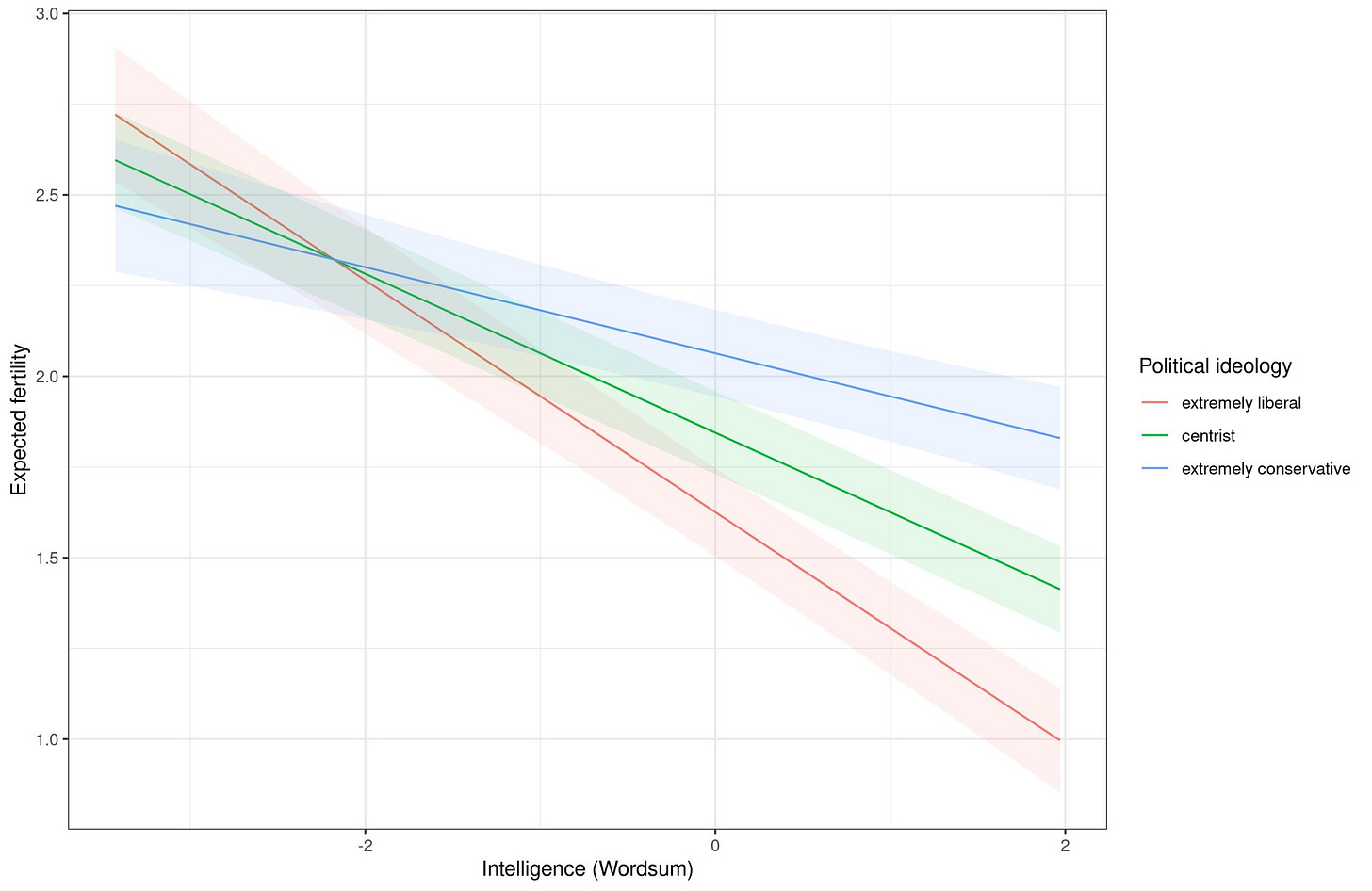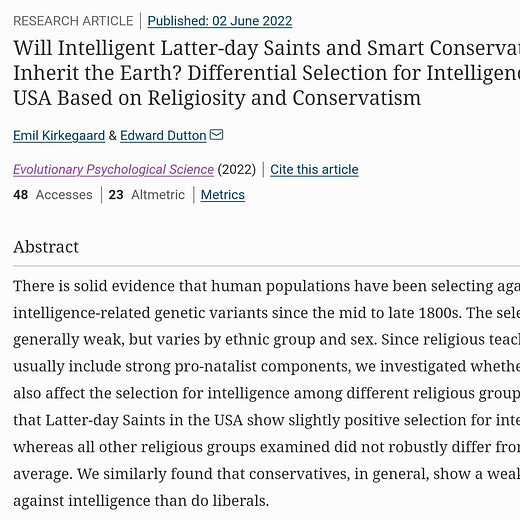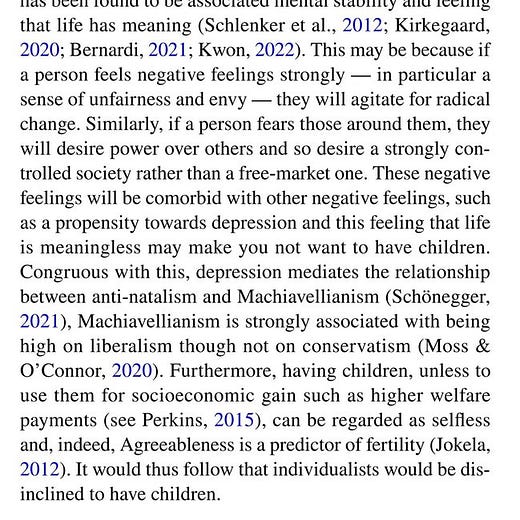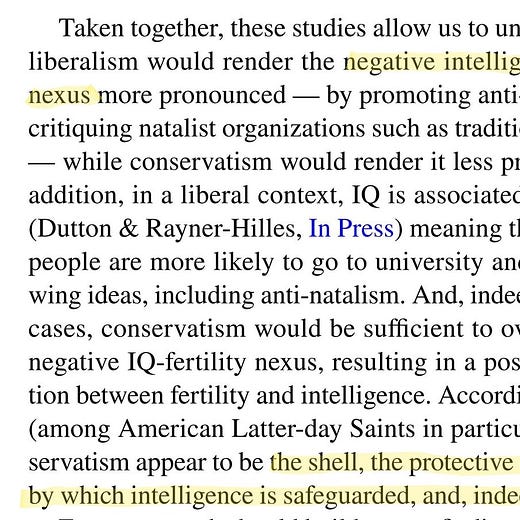New study out: Will Intelligent Latter-day Saints and Smart Conservatives Inherit the Earth?
Maybe we need to go full Mormon
Ed Dutton and I have a new study out:
Kirkegaard, E. O. W., & Dutton, E. (2022). Will Intelligent Latter-day Saints and Smart Conservatives Inherit the Earth? Differential Selection for Intelligence in the USA Based on Religiosity and Conservatism. Evolutionary Psychological Science, 1-12.
There is solid evidence that human populations have been selecting against intelligence-related genetic variants since the mid to late 1800s. The selection is generally weak, but varies by ethnic group and sex. Since religious teachings usually include strong pro-natalist components, we investigated whether this might also affect the selection for intelligence among different religious groups. We found that Latter-day Saints in the USA show slightly positive selection for intelligence, whereas all other religious groups examined did not robustly differ from the average. We similarly found that conservatives, in general, show a weaker selection against intelligence than do liberals.
Richard Hanania correctly pointed out that we -- I -- forgot to do a plot of the main results (marginal effects). But I have done these now and so let's go over them. First, if we specifically look at Mormons vs. everybody else, we get this interaction effect. The x axis has a crude measure of intelligence (Wordsum), and Y has number of children. One can model this in a few different ways: 1) controlling for age, 2) using completed fertility subgroup, 3) using a cohort standardized fertility measure as outcome. We find that no matter how one examines this, there is an interaction in pretty much every model with p < .05. Picking one of the models, it looks like this:
One can repeat the same approach but using of using Mormon, one uses the other religions. When we did this, we found... nothing. No other religious grouping in the USA has an effect like this. We examined the 13 largest groupings that the GSS provides.
Third, we tested whether political ideology would show the same pattern, and it does. But it is weaker. People who rate themselves extremely conservative still have a dysgenic fertility pattern, but it is weaker than that of those who consider themselves extremely liberal, or in the middle. Graphically:
We note that self-placement political ideology is not that accurate, so perhaps if one used a more accurate index based on, say, 10 questions, one would find something even stronger, maybe even a reversal for the conservatives.
One might extrapolate to countries and say that if one managed to move a country in a sufficiently conservative direction, dysgenics would actually be reversed. The Mormon subpopulation represents an extreme case of doing this. One could speculate on the same basis that the Amish and Orthodox Jews also show this pattern, perhaps even some of the extremist Islamic schools.
One reviewed asked us to analyze the effects jointly, and asked about religious attendance too. The results held up:
We also fitted a model that included the proposed interaction terms simultaneously, as well as religious attendance (attend, as with politics views, we recoded this on 0–1 scale for interpretation and improved statistical precision). The model showed that each of the predicted moderators of the intelligence-fertility relation held up when jointly analysed. The overall effect of g on fertility is − 0.34. The interaction with Latter-day Saint identity is 0.20 (0.087, p = 0.019), with political ideology 0.14 (0.036, p < 0.001***), and religious attendance 0.10 (0.027, p < 0.001***). Thus, a Latter-day Saint who attends church often and who is politically extremely conservative is expected to achieve a fertility-intelligence slope of − 0.34 + 0.20 + 0.14 + 0.10 = 0.10, i.e., each standard deviation of intelligence would predict an additional 0.10 lifetime fertility. This estimate is, however, very uncertain. At the request of a reviewer, we also tested for the interaction between political ideology and the two measures of religiousness (self-identification as a Latter-day Saint, and religious attendance), but neither showed an interaction (p’s = 0.06 and 0.94). This result is probably low power, so cannot be interpreted as strong evidence for a lack of an interaction. The full model output is given in the supplementary materials.
There's too many tables to repost here (like 9, and the supplements), but click the paper and read for yourself if you are more curious.
There's also the obligatory whine thread on Twitter:








I bet you could get paid to present a talk on this. Lots of Mormons would be interested.
Can you estimate error bars due to imperfect g loadings of wordsum?